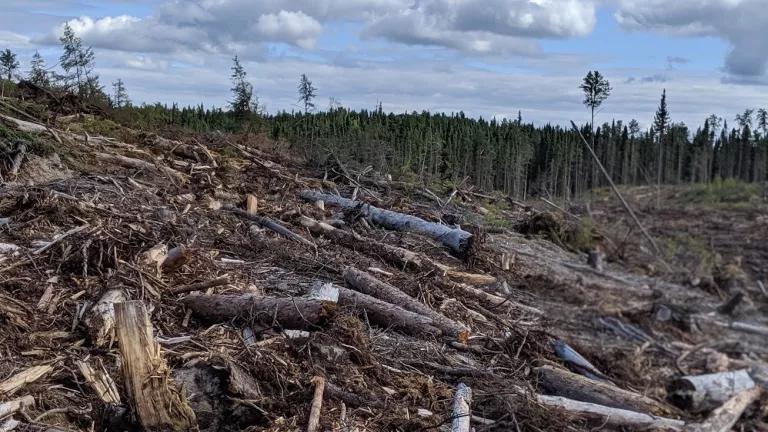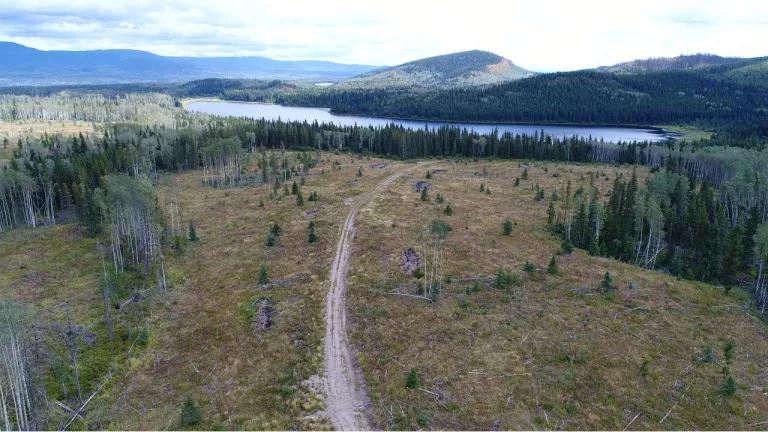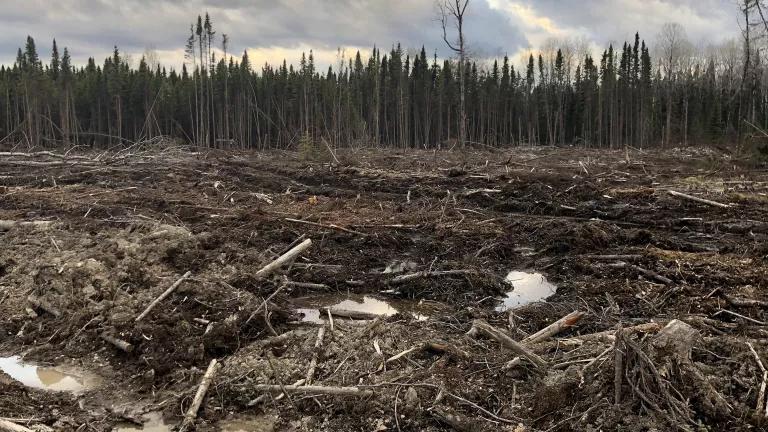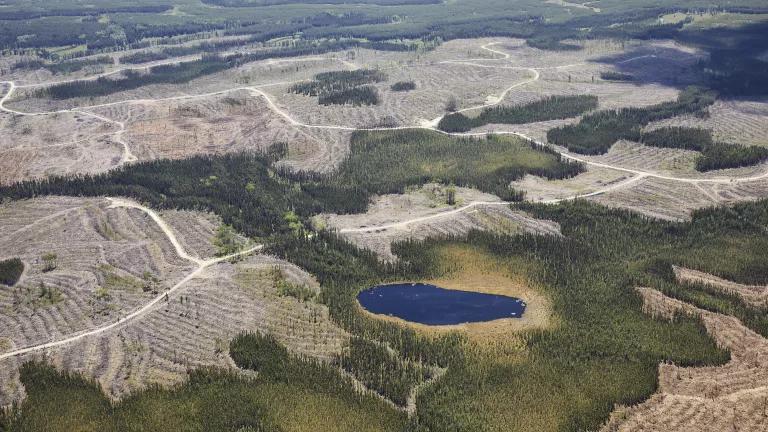Canada Should Mark Forests Day by Rejecting Logging Giveaway
Canada has near-finalized an ill-named “Conservation Agreement” with the province of Ontario, whose current government has attracted international attention for slashing environmental protections while promising to ramp up widespread industrial logging.

Logging site in Ontario
Today is the International Day of Forests: a date for celebrating forests and their value to the world. Yet it also marks a step by Canada toward greenlighting clearcuts in some of the world’s last primary forests, or areas never before logged. Canada has near-finalized an ill-named “Conservation Agreement” with the province of Ontario, whose current government has attracted international attention for slashing environmental protections while promising to ramp up widespread industrial logging. Rather than condemn this behavior, Canada’s Trudeau government appears on the verge of giving Ontario a carte blanche to continue business as usual, by advancing an agreement which would imperil the boreal forest and the species that depend on it.
Today marks the close of the comment period for the public to weigh in on the proposed Canada-Ontario Conservation Agreement. (NRDC’s submitted comments are here.) Yet its latest draft is already being widely lambasted by environmental experts as a giveaway to the logging industry.
For years, Canada’s federal government has declared boreal caribou to be a species threatened by industrial logging in Canada’s forests. Boreal caribou are an iconic Canadian species which require large areas of unlogged forest in order to survive long-term. This makes them both an “umbrella species,” which means that protecting them also protects many other species who also depend on unlogged habitat, and an ”indicator species,” which means their population decline indicates wider instability in the boreal forest.
For millennia, caribou have had deep cultural and subsistence importance for many Indigenous Peoples. And boreal caribou habitat closely overlaps with significant terrestrial carbon stores: areas which need to remain undisturbed to prevent adding more fuel to the climate crisis. Indigenous Nations and Canadian scientists have expressed deep alarm that boreal caribou and their habitat are quickly disappearing, with around 30 percent of the boreal caribou population declining every two decades.
In 2012, Canada released a Boreal Caribou Recovery Strategy, which reiterated the overwhelming scientific evidence that the widespread disturbance of caribou habitat by logging and other industrial activities threaten boreal caribou’s survival. The federal government called on provinces to release boreal caribou recovery plans by no later than October 2017. These plans were supposed to protect at least 65% of each individual boreal caribou range, or in the absence of those protections, be based on strong scientific evidence showing how a different management path would protect and sustain caribou. Yet four and a half years later, not a single province has released a recovery strategy aligned with the federal requirements.
In fact, rather than make any genuine effort to protect the boreal forest, the Ontario government has ramped up the forest-clearing activities that imperil forest species. The government has announced plans to double logging rates in the province. Ontario permanently exempted forestry operations from its own Endangered Species Act, and it has eradicated important safeguards that allowed public input into forest management decisions, resulting in multiple environmental organizations suing the government. Studies from boreal forest sites in Ontario illustrates that logging practices are resulting in significantly undercounted levels of deforestation. Ontario even allows logging in one of its most iconic “protected” parks. Ontario’s lack of forest protections are so severe that the province’s own Auditor General determined that Premier Ford’s policies are endangering species at risk. And beyond harming species, these activities threaten primary forests, community rights, and the ability of the global community to address the climate crisis before it’s too late.
Based on its obligations under Canada’s federal species protection laws, Canada should require that any agreement with Ontario include clear safeguards for species that would demonstrably benefit threatened species and enhance their survival. And where Ontario has failed to protect particularly imperiled herds, the federal government is authorized to step in to protect them. Instead, Canada is on course to reward Ontario’s poor behavior, co-creating a weak agreement encouraging vague processes which do little more than require Ontario to keep deliberating while permitting the ramping up of logging of caribou habitat.
The draft agreement would require no protection for boreal caribou critical habitat, which puts it completely at odds with the federal government’s own caribou recovery strategy. It would provide no binding, science-based steps to support caribou recovery, and no requirements to restore already degraded habitat. Canadian legal experts have called it “the weakest conservation agreement yet proposed in Canada” and stress that it would leave Canada “in breach of [its] legal obligations” under Canada’s own key species protection laws.
If the Trudeau government is going to live up to its sought-after reputation as an environmental leader, this agreement would be ten steps in the wrong direction. The federal government has important tools it can leverage; instead the current draft agreement would be caving to a provincial leader who is notorious for catering to industry and inaction on climate change. It would also represent the Trudeau government proactively enabling policies that are contributing to widespread species decline and forest harm. Canada should stand up for forests and the communities that protect them by requiring science-based, enforceable species-saving provincial recovery plans. Canada should also listen to Indigenous leaders and environmental organizations, and step in to protect forest areas that are particularly vulnerable. And it should finally start accounting and reporting the devastating climate cost of logging the boreal forest. As written, the draft agreement would not be a solution, but a greenwash.


